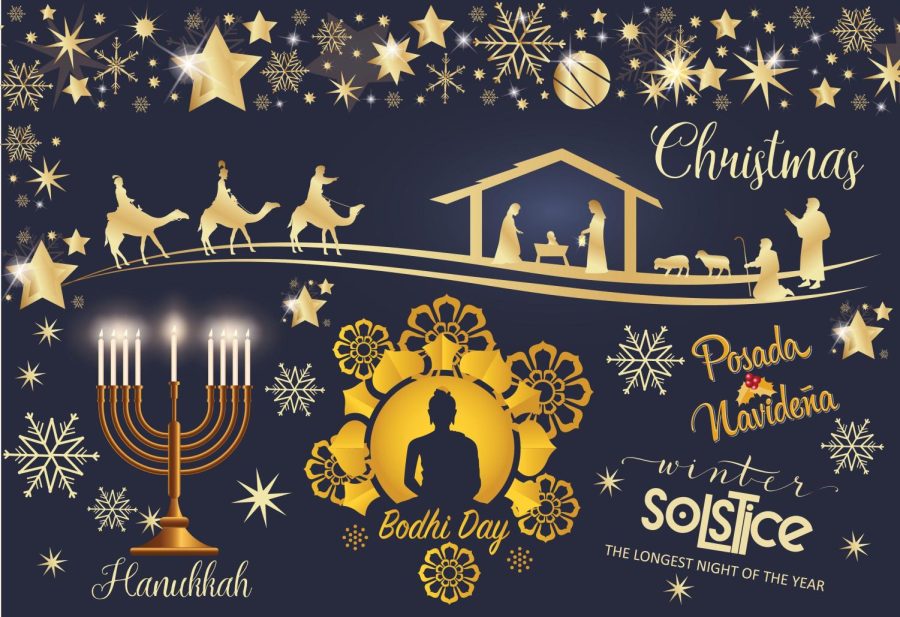What the holiday means to non-Christians
December 22, 2022
As winter break approaches, students are getting ready to sleep in and enjoy every moment of their break. While many students and staff will gather with family to celebrate Christmas, there are still many who have different plans. It’s during this time of celebration and family that we must remember the significance of appreciating our differences and embracing diversity.
Isabella Drischler, a reformed Jewish senior who has grown up practicing Judaism, celebrates in mindful ways that respects other religions while still honoring her own. As she has friends and family that celebrate the non-Jewish holiday, she still manages to find joy in spending time with them and through exchanging gifts in the popular tradition known as secret Santa.
“I know even though it’s not a big time for me, it is a big time for other people and I love any opportunity to do gifts, or any opportunity to let people know how I love them and how I care about them,” Drischler said.
As she enjoys making those around her happy, she makes sure to partake in her very own religious traditions. This is through the celebration of Hanukkah which occurs around the same time as Christmas. Hanukkah, an eight day Jewish celebration, reaffirms the ideals of Judaism and commemorates the rededication of the Second Temple of Jerusalem. It is celebrated by the lighting of a menorah, playing the game of dreidel, and eating special holiday food like latkes.
“I love my menorahs, it is always a very significant time for me to be able to light my menorah with my family. Growing up and learning the prayer that we sang, and having to study that in November coming up to December, and the first time I was able to say it on my own, or the first time that I sang it with my grandmother, that was a core memory. It’s a nice holiday. It’s happy, it’s pleasant, it’s fun,” Drischler said.
In terms of actual Christmas day, over time the Jewish have unintentionally made it a tradition to dine at American Chinese cuisine style restaurants. Since most businesses and restaurants were in fact closed because of Christmas, Jewish people decided to navigate towards Chinese restaurants since most are usually open.
“You can always see it in articles when people are asked they’ll say, that’s a tradition because that’s what’s accessible,” she said.
While Hanukkah is a joyful time, it is important to note that it is not of the largest significance within Judaism. The main misconception is rooted in the fact that Hanukkah is in close proximity to Christmas. Many people have only come to learn about it through the holidays because it is simply convenient, not because they show genuine interest.
“The only reason that it is really important to non-Jewish people is because of Christmas. I wish that it wasn’t ‘Jewish Christmas.’ I wish it wasn’t perceived that way, because it’s not, and that’s kind of a strange way of looking at things that is not necessarily representative,” Drischler said.
Though the religious importance of Hanukkah is vastly different from Christmas, this is not where it stops. Many are familiar with the biblical story attached to the origins of Christmas, as the wide majority of Christians celebrate the birth of Jesus. There is a general celebration of family and an appreciation for what has been given. While this is still somewhat present in Jewish holidays, it is more based in an understanding of collective strength throughout history.
“On a grand scale, most Jewish holidays are celebrated in Jewish existence and Jewish perseverance. It is realizing that while we have been persecuted for so long, there have been multiple attempts to eradicate our religion. It’s that we’re alive, and we’re Jewish, and there are Jews here, and there are always going to be Jews. We are incredibly resilient,” Drischler stated.
It is the strength of Judaism that is central to holidays, yet it is this strong celebration that is still forced into alienation. Many children were raised learning about the history and traditions of Christmas, but are never fully taught about other religious cultures.
“Because none of our holidays are commercial, they all have religious significance, and it’s hard to teach other people religious significance when they don’t follow that religion. When I was younger, it was a little strange, especially since I have always been excited about my Jewish identity, and for a while now it’s been something I try hard not to hide,” she said.
When we talk about the holiday season, our language has become relatively more inclusive, but there is still the underlying understanding that we leave school for Christmas, we celebrate Christmas, we request off work for Christmas.
As observed by Shaler Area high school Japanese teacher Steve Balsomico, there is the idea that any celebration outside of Christmas is inherently an outlier. Balsomico Sensei noted the deep connection between Christaintiy and Christmas, despite the fact that many non-religious people have come to celebrate the holiday throughout their life.
“As long as we have Christmas being the nationally mandated center point of the holiday season, then that means that those who were not raised in a Christian tradition will be unfortunately excluded,” Balsomico said.
The capitalization and commercialization of a religious holiday has only led to a blur within the separation of church and state. This lack of separation was emphasized as Balsomico Sensei spoke of his travels to Japan as an agnostic and experiencing a culture shock once seeing the difference in how Japanese citizens chose to celebrate.
“The Japanese are very much secular in their celebration of Christmas. They celebrate it, but it’s very much a non-Christian thing because there’s no tradition of Christianity in Japan. And so while there, I was able to really find a joy in Christmas that had nothing to do with he Christian roots, and it was very much a time of togetherness, a time of celebration, a time of family and friends, and as a result of that, I really found that joy. I loved it,” Balsomico said.
Using the images of different ways other cultures celebrate, he acknowledged celebrating Christmas tradition as a time of love and togetherness, without necessarily practicing the religion it centers. The problem lies is between the lines. As America prides itself on the sharing of differences among its people, it is sometimes rare that we actually see this in practice.
By making Christmas a secular holiday rather than a national one, this allows for everyone to celebrate their religious identity without overshadowing others. By eliminating the idea that “everyone celebrates Christmas” and replacing it with celebrating holiday and winter traditions, we can come together as a nation despite religious differences.
“I think the idea behind celebrating Christmas is a beautiful idea in the sense that we are putting in a spirit of holiday, of togetherness and celebration. If we as a nation want to celebrate Christmas, we have to remove that Christian motif,” Balsomico said.




